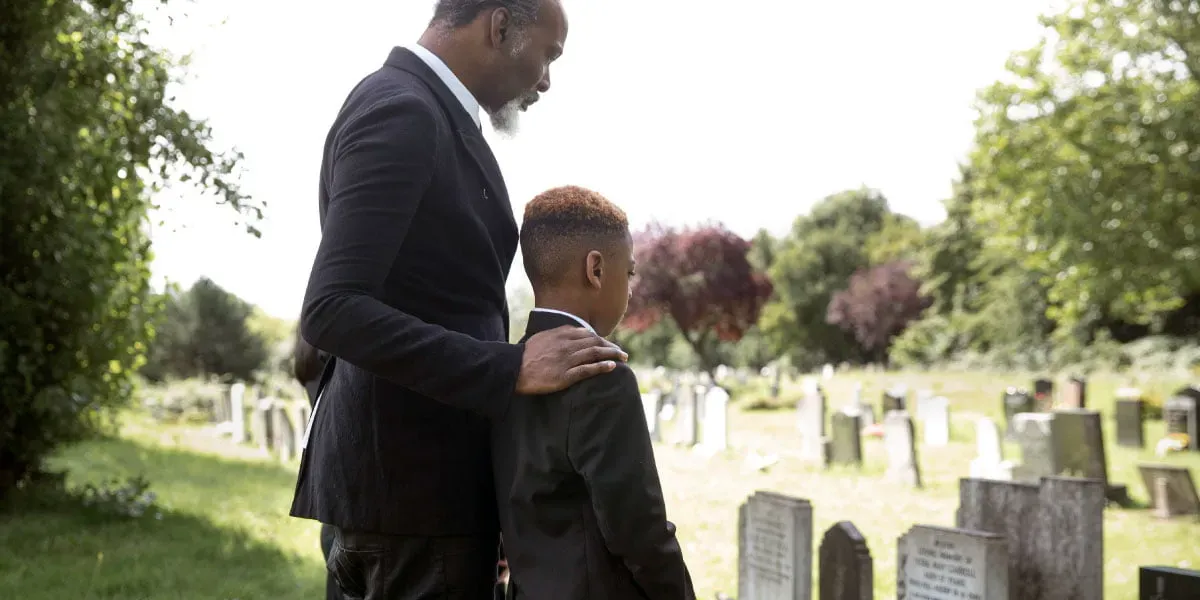Losing a loved one is one of the hardest parts of life. If it were in our hands, we would always keep the ones we love close and never let them go. But life doesn’t give us a choice. And sooner or later, we will have to face this bitter truth.
This can be tough on children too. Their understanding of the realities of life is more limited compared to us. Most of the time, death is not a thought that crosses their minds regularly. So, when somebody that they love suddenly leaves their lives forever, it can affect them in many ways. In the first step, the way you break the news to them is very important. Here, we’ll provide some advice on how to tell a child about death of a grandparent or a loved one so that they can cope with the sad news more easily.
Children’s Perception of Death Based on Age
As children age, their understanding of death develops. Child Bereavement UK has given a complete guide on how children of different age ranges understand death. Here, we give a short overview of the subject:
Children Under 2
At this age, children have no understanding of the concept of death. However, this doesn’t mean that they don’t feel it when their carer is not with them. From the age of 6 months, babies will sense abandonment and distress when a primary carer is not around.
Children of 2 to 5 Years
Children aged 2 to 5 years old develop an incomplete awareness of death. They understand when an animal or a person dies. However, they don’t fully grasp the fact that the deceased person or animal has ceased to exist and is not going to come back. At this age, death can be accompanied by questions about the departed person’s whereabouts and situation.
Children of 5 to 7 Years
The gaps in children’s knowledge of death are gradually filled when they reach 5 to 7 years. They realize that death is permanent and that all living things eventually pass away.
Teenagers
Teenagers’ understanding of death corresponds to that of adults. However, how they deal with grief may differ. They might engage in risky behavior or experience depression. Read more about how to talk to your teenager about death.
How to Tell a Child About Death of a Loved One
Children usually have a soft spot for their grandparents. They’re the ones who take children’s side when their parents are mad, the ones who try to force-feed them delicious meals until the point of explosion, and the ones who always have some money to give behind parents’ backs. A grandparent’s passing away can suddenly leave a hollow spot in a child’s life. That’s why it’s important to give them the news carefully. Here are some tips on how to tell a child about death of a loved one:
Choose the Right Words
When you’re about to tell your child that a grandparent has passed away, it’s important that you say it in a way that won’t create any misunderstandings. This is especially important if your child is still too young to properly understand what dying means. You shouldn’t try to downplay the severity of the incident by using less harsh expressions. Using phrases like “has gone to sleep” or “is in another place” might lead a young kid to believe the deceased will return. This can take a toll on them later.
Be Supportive
Children might not show it, but they’re going to need a lot of support and reassurance during this time. You should be there for them and give them time to process and express their feelings. Sometimes children, especially teenagers, turn silent when they’re grieving. It’s important that you give them enough space, but also show them that you’re going to be there if and when they need to talk. Learn how to get a teenager to talk about their feelings.

Offer Appropriate Outlets for Grief
The pain of bereavement may become unbearable after a while. So, the grieving person might engage in risky behavior to numb the pain. A 2017 study published in Addiction Research & Theory showed that almost 35% of people with substance use problems had been dealing with complicated grief due to bereavement.
The same goes for children and teens. As a parent, you should make sure that they’re not doing anything dangerous to relieve their pain. A parental control app might come in handy in this situation. Safes is a good example that can help you track your children’s online activity and make sure they’re not engaging in risky behavior. You can install it on iOS, Android, and Windows and start your free trial period.
Instead of unhealthy ways to deal with grief, guide them to express their feelings in more appropriate ways. Remembering the deceased person, cherishing the time you had together, and celebrating important dates can help them feel more connected to their feelings. Also, if you feel that it can help, plan a movie night, take a trip together, or just order takeout.
A Word
The above tips on how to tell a child about death of a grandparent or a loved one are necessary but not sufficient. Children love deeply and get attached easily. So, it can hit them hard when they lose a loved one. However, they have their whole life ahead of them and sooner or later, they should be able to get over the pain and move on with their lives. If you feel that they have lingering grief that has lasted for a long time and is interrupting their daily life, don’t hesitate to get professional help.

